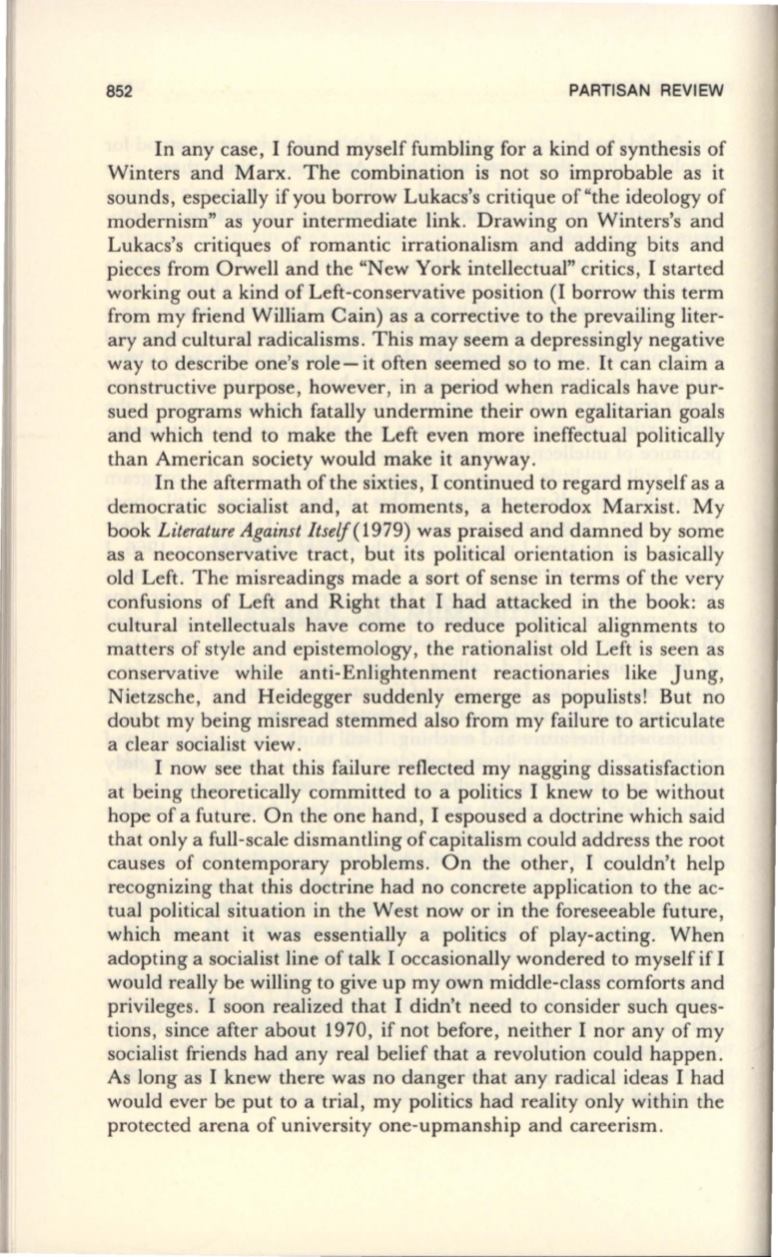
852
PARTISAN REVIEW
In any case, I found myself fumbling for a kind of synthesis of
Winters and Marx. The combination is not so improbable as it
sounds, especially if you borrow Lukacs's critique of "the ideology of
modernism" as your intermediate link. Drawing on Winters's and
Lukacs's critiques of romantic irrationalism and adding bits and
pieces from Orwell and the "New York intellectual" critics, I started
working out a kind of Left-conservative position (I borrow this term
from my friend William Cain) as a corrective to the prevailing liter–
ary and cultural radicalisms. This may seem a depressingly negative
way to describe one's role- it often seemed so to me .
It
can claim a
constructive purpose, however, in a period when radicals have pur–
sued programs which fatally undermine their own egalitarian goals
and which tend to make the Left even more ineffectual politically
than American society would make it anyway .
In the aftermath of the sixties, I continued to regard myself as a
democratic socialist and, at moments, a heterodox Marxist. My
book
Literature Against Itself
(
1979) was praised and damned by some
as a neoconservative tract , but its political orientation is basically
old Left. The misreadings made a sort of sense in terms of the very
confusions of Left and Right that I had attacked in the book : as
cultural intellectuals have come to reduce political alignments to
matters of style and epistemology, the rationalist old Left is seen as
conservative while anti-Enlightenment reactionaries like
J
ung,
Nietzsche, and Heidegger suddenly emerge as populists! But no
doubt my being misread stemmed also from my failure to articulate
a clear socialist view.
I now see that this failure reflected my nagging dissatisfaction
at being theoretically committed to a politics I knew to be without
hope of a future . On the one hand, I espoused a doctrine which said
that only a full-scale dismantling of capitalism could address the root
causes of contemporary problems. On the other, I couldn't help
recognizing that this doctrine had no concrete application to the ac–
tual political situation in the West now or in the foreseeable future,
which meant it was essentially a politics of play-acting. When
adopting a socialist line of talk I occasionally wondered to myself if I
would really be willing to give up my own middle-class comforts and
privileges. I soon realized that I didn't need to consider such ques–
tions , since after about 1970, if not before, neither I nor any of my
socialist friends had any real belief that a revolution could happen .
As long as I knew there was no danger that any radical ideas I had
would ever be put to a trial, my politics had reality only within the
protected arena of university one-upmanship and careerism .


